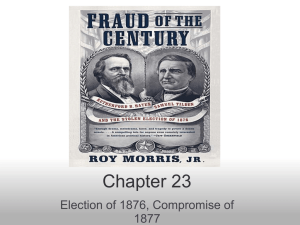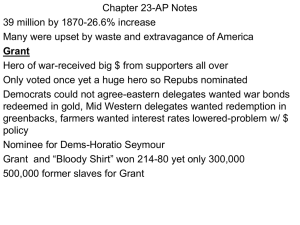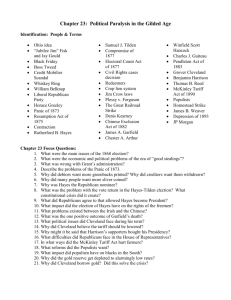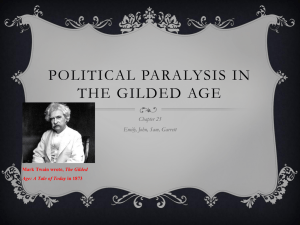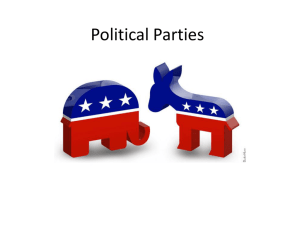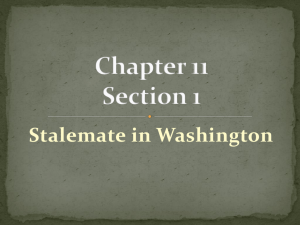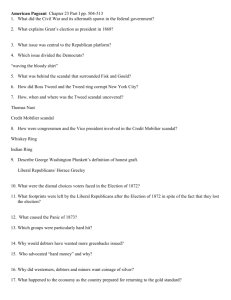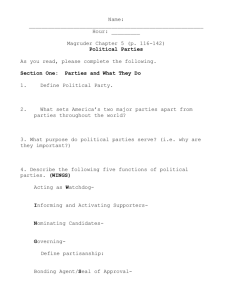Chapter 23
advertisement
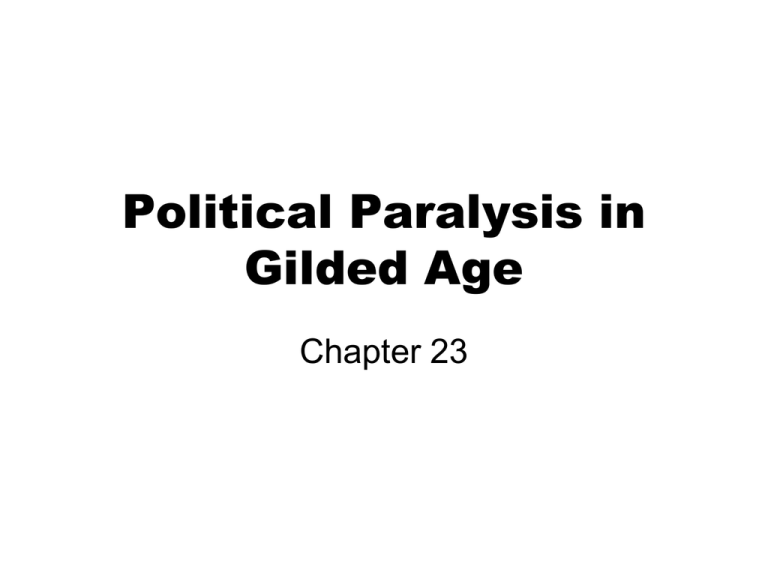
Political Paralysis in Gilded Age Chapter 23 Election of 1868 • • Ulysses S Grant (R) Horatio Seymour (D) • Americans disillusioned with professional politicians so wanted military leader • “Waving Bloody Shirt” – Republicans tactic to remind voters that Republicans freed slaves and won war Democrats were split on economic issues – Eastern democrats wanted war bonds paid with gold – “Ohio Idea” wanted bonds paid in greenbacks to increase money in circulation • • Grant elected in 1868 on strength of black votes – Was a moderate Republican • Supported military reconstruction Political Scandals • • • • • Corruption was very common in business and politics in post-war America – “Jubilee Jim” Fisk and Jay Gould attempted to manipulate price of gold causing many to lose all their money – Boss Tweed – political boss of New York City • Stole so much he almost bankrupt the city • Was brought down by Thomas Nast and Samuel Tilden Many corrupt officials in Grant administration Credit Mobilier Scandal 1872 – Union Pacific used Credit Mobilier construction company to scam money from Federal government – Gave stocks to congressmen to avoid investigations Whiskey Ring 1874-5 – Excise tax was taken from Treasury Salary Grab – Politicians voted to give selves large raises Election of 1872 • Liberal Republicans and Democrats nominate Horace Greeley, editor of New York Tribune • • – Argued to smooth over differences between North and South Republicans re-nominated Grant Grant won the election – Republicans moved to heal wounds with south by reinstating many Confederates, also took measures to end corruption in government Panic of 1873 • • • Fires in Boston and Chicago led to problems with insurance companies – Led to major depression that lasted 5 years – Many businesses were overextended and banks made risky loans Debtors demanded issuance of greenbacks to help inflation – “hard money” vs “cheap money” • Cheap money creates inflation that makes it easier to pay back debts • Hard money prefer deflation to protect value of debt – Hard money won in 1874 and government began withdrawing paper money from circulation Cheap money started arguing for coinage of silver – Would also promote inflation Gilded Age1860-1900 • • • • Gilded Age – coined by Mark Twain – From the decorations in homes of wealthy – Wealthy had palace like homes Characteristics – Rapid Industrialization, Growth of Businesses, Immigration, Growth of Cities, Development of Leisure Culture, Corruption in politics Politics – Even balance between Republicans and Democrats • Not much difference between parties, resulted in high voter turnouts and shits in power between parties – Republicans got strength from Puritanism, strict morality and government role in economy, base in midwest and small town areas of Northeast – Democrats got strength from immigrants, Lutherans and Catholics, resistance to one moral code, laissez faire economic attitude. Base was in South and Northern industrial cities Patronage – Giving jobs in exchange for votes – Stalwarts led by Roscoe Conkling supported patronage – Half Breeds led by James G Blaine supported Civil Service Reform Election of 1876 Rutherford B. Hayes (Republican) • • • • • • Sam Tilden (Democrat) Rutherford B Hayes (R) – Union General – Was a compromise, unknown candidate between Conkling and Blaine – Could help deliver Ohio Samuel Tilden (D) – With Thomas Nast brought down corrupt Tweed ring in NYC No Democrat had been elected President since Buchanan in 1856 Tilden was winning 184 to 165 in electoral college – South Carolina, Louisiana, and Florida elections were disputed and gave two sets of returns Electoral Count Act (1876) created the Electoral Commission to count votes and determine who won disputed elections – 5 Representatives, 5 Senators, 5 Justices; 8 Republicans, 7 Democrats; Gave FL, SC and LA to Hayes based on partisan vote Hayes wins 185-184 Compromise of 1877 • Democrats let Hayes win if – Federal troops leave south – Southerners appointed to Cabinet – Southern Democrats get control of patronage – Hayes supports internal improvements in South • Including Texas-Pacific Railroad through the South • Hayes was winner – Compromise of 1877 ends Reconstruction – Also ended political protection of freedmen in the South – Civil Rights Cases (1883) ruled Civil Rights Act (1875) unconstitutional • Said 14th Amendment prohibited governmental violations of civil rights, not violations by individuals Segregated South • • Redeemer Governments – White southerners reclaimed political power in the South Sharecropping and tenant farming – Crop lien system • Tennant would work farm and pay rent, food, supplies with part of crop – Created cycle of poverty in South – Blacks did not have land to work on – Whites did not have money to pay for labor • Jim Crow Laws – 1890’s – Made segregation official policy of state – Segregation • legal separation of races – Literacy tests, poll taxes and voter registration laws were used to disenfranchise blacks • Plessy v Ferguson (1896 ) – Plessy refuse to sit in colored train car, took case to Supreme Court – Supreme Court rule “separate but equal” was ok\ – Justified and defended segregation Lynchings • Lynching – Public murder of a person by vigilantes – Occurred in every state • • • Used to intimidate black people and their white supporters Used terror to stop people from voting and to reinforce traditional white dominated culture Target blacks who own land, people who taught blacks Class Conflict and Ethnic Clashes • Railroad Strike of 1877 – railroads were losing money so cut back wages – workers went on strike in West Virginia and spread to other areas had support of poor and working classes – Workers and Railroad officials fought. – President Rutherford B Hayes called in the army to put down strike, several hundred people died – Demonstrated weakness of labor movement – Came from ethnic divisions within labor especially between Irish and Chinese • Denis Kearney led anti Chinese movement and encouraged attacks against them to stop competition for jobs and opportunities • Chinese Exclusion Act 1882 • Law to stop Chinese immigration • People opposed Chinese taking jobs • People didn’t like Chinese culture • Act was supported by Knights of Labor • US v Wong Kim Ark (1898) – Ruled 14th amendment applied to all born in America (jus soli citizenship) Attacking the Spoils System • So much corruption that people begin asking for reform • Reformers attack spoils system because unqualified people get jobs • Want change in civil service system • Civil Service jobs are appointed not elected James Garfield, 20th President (1881) Chester A Arthur, 21st President (1881-1885) • • • • • Hayes was replaced by Garfield as Republican candidate and “Stalwart” Chester A Arthur was Vice President Democrats nominated Winfield Scott Hancock Republicans use “Bloody Shirt” to win Garfield assassinated by Charles Guiteau in Buffalo, NY who wanted a civil service job – Guiteau was a Stalwart and supported Roscoe Conkling Chester Arthur – Was a political boss from NYC – Pendleton Act in 1883 • requires people to take a test to get a civil servant job • forbid firing of employees because of politics – Effect of reform was to shift politicians focus from patronage to support from corporations and lobbyists 1884 Election • • • James Blaine chosen by Republicans to replace Chester A Arthur – Had a reputation of being a corrupt politician who supported patronage – Mugwumps were Republicans who opposed Blaine joined Democrats – Blaine supporters attacked Cleveland for having an illegitimate child and labeled Democrats as party of “Rum, Romanism and Rebellion” (alienated Irish) Grover Cleveland nominated by Democrats – Popular reformer who wanted to end protectionist tariffs – Attacked Blaine for “Mulligan letters” showing corrupt relationship with business Cleveland won the election by carrying New York – First Democrat President since Buchanan Grover Cleveland • • • • • Believed in laissez-faire, did not believe government should support individuals Had support of Mugwumps that demanded civil service reform, but gave patronage positions to Democrats Resisted pension bills for War veterans that were unwarranted Wanted to reduce tariffs – Tariffs had protected and encouraged northern industries – Had created budget excessive budget surpluses Election of 1888 – Cleveland nominated by Democrats; Benjamin Harrison by Republicans • Big Business gave lots of money to Harrison to help defeat Cleveland and stop tariff reform • Bought votes – Harrison won election, Cleveland was first incumbent to lose since 1840 Grover Cleveland Benjamin Harrison Billion Dollar Congress • • • • Republicans controlled Congress. Speaker Thomas Reed used authoritarian, partisan tactics to limit Democrats influence Ends deadlock in politics Government spends so much it is known as Billion Dollar Congress – Pensions for Civil War veterans – Purchased silver – McKinley Tariff (1890) increased tariffs to highest levels • Helped industry but hurt farmers because it discouraged imports • Began political activism of farmers including creating the Farmers Alliance Cooperatives (Farmers Alliance) – Businesses, owned by groups of farmers, were created to buy and control resources – lowered prices because middleman was eliminated – Farmers elect politicians that would support their needs • laws limited railroad and storage rates Populist Party “People’s Party” • Populist Party create as a third party to argue for farmers needs – Spawned from concerns of Farmer’s Alliance – Third parties are rarely elected – Can make major parties address their needs • Populists favor debtors instead of creditors most popular in West and South • • • Populist demands – free and unlimited coinage of silver – government ownership of railroads, telephone and telegraph – Direct election of Senators – Initiative and referendum – Immigration restrictions – Shorter work day Attempted to address needs of both workers and farmers Homestead Strike • Homestead Strike – 1892 – Against Carnegie’s steel plants in Pennsylvania – Carnegie would only deal with one person at time – Union protest, so company Locked out union • Lock out – when company doesn’t allow workers to come to work • Strike – when workers refuse to come to work – Pinkerton Agents • private police force hired by Carnegie to break strike • fought with strikers and several died – Governor call in militia to break strike Election of 1892 • • • Democrats nominated Grover Cleveland, Cleveland won Republicans nominated Benjamin Harrison Populists nominated General James Weaver • Populists lose but do well in South and West – Make major parties pay attention to needs of Populists – Southern influence limited when Democrats used racial issues to separate black and white poor farmers – Eastern workers did not support Populists for fear of losing jobs • Strength of black Populists led to increased efforts to disenfranchise blacks with grandfather clauses, poll taxes and literacy tests Cleveland and Depression • • • • • White backlash against black support for Populists caused Populists to turn away from blacks Depression of 1893 – Overbuilding, speculation, labor unrest and farming problems led to depression – Laissez faire attitude led to government unable to assist with effects of depression Repeal of Silver Purchase Act of 1890 – Happened in 1893 to protect the gold reserves – William Jennings Bryan opposed the move Cleveland had to borrow gold from bankers to protect the American currency – Opponents of Cleveland felt move represented inappropriate connection between government and bankers Wilson Gorman Tariff (1894) – Established an income tax and high tariffs – Supreme Court ruled income tax unconstitutional – Made Populists feel government was controlled by financial interests


